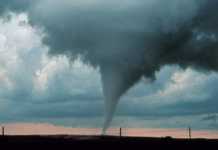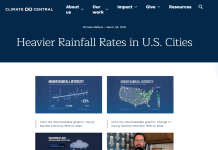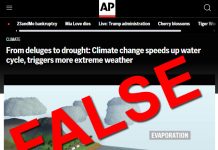The New York Times (NYT) published an October 27 article accusing President Trump of fighting “against climate science,” while the NYT itself misrepresents climate science.
In the article titled, “As Election Nears, Trump Makes a Final Push Against Climate Science,” the NYT implies the Trump administration is fighting against climate science by appointing
research meteorologist Ryan Maue, Ph.D., as chief scientist at the National Oceanic and Atmospheric Administration (NOAA), and appointing David Legates, Ph.D., former state climatologist for Delaware, as deputy assistant secretary of commerce for observation and prediction at NOAA. Maue’s appointment is problematic according to the NYT because he “has criticized climate scientists for what he has called unnecessarily dire predictions.”
A google scholar search of Maue’s publications shows he is well qualified for the position of NOAA chief scientist. Maue has authored or co-authored more than 30 peer-reviewed articles discussing climate change. Simultaneously, Maue served as a meteorologist at WeatherBELL Analytics, a widely used weather forecasting service. Much of Maue’s research presents real-world data to demonstrate that human-induced climate change is not causing more powerful and more frequent hurricanes.
A Google Scholar search of Legates’ name shows he has authored or co-authored 140 peer-reviewed climate-change-related articles. The topics of Legates’ papers range from the earth’s climate sensitivity as shown by actual measurements, the validity of climate models, drought and flood patterns across the United States, and the impact of warming on polar bear populations. Once again, the objective record shows Legates is well qualified to direct and inform government research on climate related matters.
The NYT is not the first mainstream media outlet to criticize the Maue and Legates appointments. For example, Climate Realism refuted the ad-hominem charges leveled against Legates by National Public Radio shortly after his appointment to NOAA. The author of that Climate Realism article wrote, “The very definition of science, in its most-basic sense from The Enlightenment to 2020, is ‘questioning the basic tenets’ of current assumptions. [Legates has] examined the data for many, many years and has not seen persuasive evidence that humans are the chief drivers of climate change.”
NOAA is charged with assembling the National Climate Assessment every four years. The report includes input from 13 federal agencies and outside scientists, supposedly to present objective knowledge concerning the causes and consequences of climate change. Rather than being objective, NOAA’s 2018 report referenced the Intergovernmental Panel on Climate Change’s (IPCC) worst-case scenario to claim climate change poses an imminent and dire threat to the United States. The IPCC itself has disavowed its worst-case scenario, admitting it has only a three-percent chance of becoming a reality.
NOAA’s Climate Assessment ignored hundreds of unalarming peer-reviewed articles and books published by dozens of prominent researchers including, for example, physicists Will Happer, Ph.D., Richard Lindzen, Ph.D., Willie Soon, Ph.D., and atmospheric scientists, John Christy, Ph.D., Pat Michaels, Ph.D., and Roy Spencer, Ph.D. These scientists, and many others, have published research showing that the human impact on global temperatures is and will be, at most, minimal. According to these scholars, natural factors, such as, cloud formation, solar activity, and large-scale ocean circulation patterns are the dominant drivers of climate shifts. Other studies have concluded, based on measurable data, that the modest climate change the Earth has so far experienced has been beneficial. Research also indicates a continued modest increase in temperatures is highly unlikely to result in extreme weather changes.
NOAA has also previously ignored findings of the 14 peer-reviewed volumes produced by the Nongovernmental International Panel on Climate Change. In particular, NIPCC’s Climate Change Reconsidered series presents a comprehensive literature review of the peer-reviewed evidence indicating human influence on climate is minimal and that present climate change is not catastrophic. NIPCC’s reports are written and/or reviewed by hundreds of researchers, yet the past political leadership of NOAA has ignored them and the thousands of peer-reviewed papers they reference.
The appointments of Maue and Legates to NOAA present an opportunity to reinforce the proper use of the scientific method in government research. The Scientific Method demands that researchers question self-proclaimed consensus science. In the field of climate research, this means carefully considering the broad range of evidence concerning the causes and consequences of climate change when federal reports are developed. This would represent a shift from NOAA’s previous practice, in which it referenced a narrow body of research to support the politically predetermined conclusion that dangerous human-caused climate change is happening.
It is not surprising that the NYT dismisses the Trump administration’s attempts to defend the Scientific Method from doctrinaire views of climate change. Trump’s previous efforts to bring transparency to scientific research and to prevent corruption in the funding process for scientific research have been similarly critiqued by climate alarmists. Left-leaning mainstream media outlets, academics who’ve learned to manipulate the current closed system, and political partisans who use the cloak of “following the science” to promote their personal political agendas reject transparency and support self-dealing.
As the peer-reviewed research by Legates, Maue and hundreds of other scientists makes clear, there is an active scientific debate concerning the causes, extent, and consequences of climate change. Trump’s appointments of Legates and Maue may bring justified and necessary balance to federal reports on the state of climate science.
[Photo courtesy of Haxorjoe, Wikimedia Commons, https://commons.wikimedia.org/wiki/File:Nytimes_hq.jpg]



















[…] Read more at Climate Realism […]
[…] By H. Sterling Burnett – ClimateRealism – October 29, 2020 […]
The only truthful things the times has deliberately printed in several decades are showtimes.